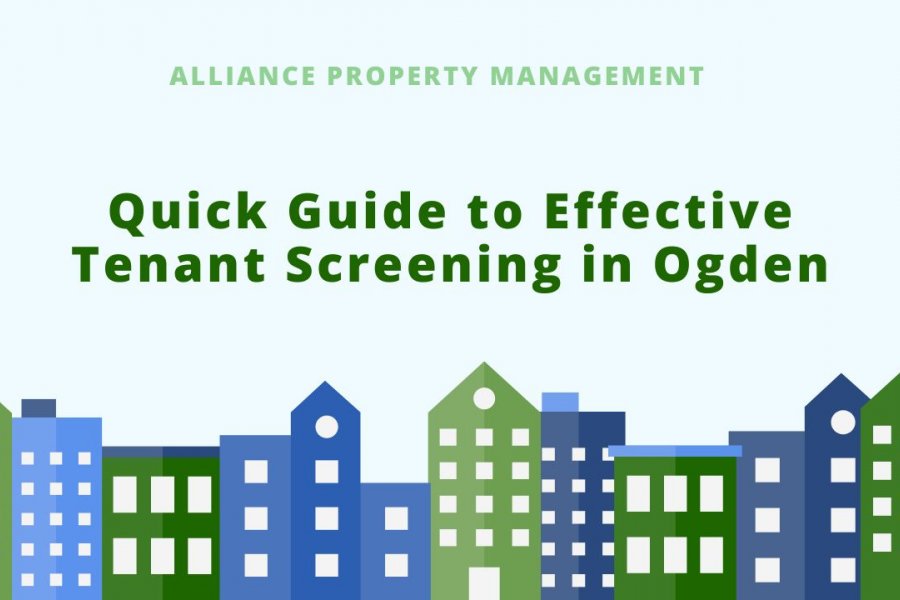
It goes without saying that when you rent out your house in Ogden, you want tenants who will keep it intact and pay the rent in full and on time every month. You have to have a strategy in place to find the best tenants. It's important to choose a desirable tenant, and you should always be able to make a concrete justification for your decision to accept or deny an applicant.
Tenant screening is a crucial step in the leasing process. It will help you prevent damage to your property in the long run. Leasing to a careless renter may force you to replace missing items or undertake expensive repairs to your property.
Vetting tenants is an integral element of being a landlord. But how can you go about doing it best?
Design Requirements for Your Tenant Screening Process
The following actions and processes should be included in your optimized tenant screening process:
- Pre-screening.
- Requiring an application.
- Contacting past employers and landlords.
- Doing background and credit checks.
- Pre-determined criteria that will help you decide whether to approve or reject a tenant.
Decide on Your Fundamental Tenant Standards
In order to weed out potentially troublesome renters, landlords must decide on the minimum standards they’re willing to accept.

You have the legal right to accept or reject a tenant in accordance with the conditions. Make sure you can properly cite the rental process as the reason you are dismissing a tenant. This includes having set tenant standards such as creditworthiness (Fair Credit Reporting Act) and income capability.
Request a Formal Rental Application
After choosing what qualities you value when looking for in a prospective renter, you should request a proper rental application from the tenant. The request is the best way to get important information from prospective tenants. These include their history of employment and tenancy.
Furthermore, it's suggested that you request a bank statement and reference check from each prospective tenant to allow you to get a clearer idea of the people you'll be leasing to.
Take Initiative and Be Consistent
Consistency is necessary to avoid forgetting important facts about a possible renter. If a prospective tenant refuses to participate in a phase of your screening process, you shouldn't move forward with them.
By making sure that you treat each renter candidate fairly, consistency could also prevent you from infringing on federal or Utah Fair Housing regulations. Renters are protected from prejudices by the Fair Housing Act. Requiring a background check for one applicant but not another could be seen as unjust treatment or an ethnic or gender bias.

Respect the Fair Housing Laws
It can be costly for property owners, even those with the best of intentions, to defend themselves against Fair Housing Act claims. To reduce complaints, be aware of the Federal Fair Housing Act, which forbids tenant selection and refusal based on the protected designations stipulated by law:
- Race
- Color
- Gender
- Nationality
- Impairments
- Familial status
- Religious beliefs
In some circumstances, extra standards are outlined in state housing regulations. They include:
- Age
- Relational status
- Military status
- Citizen status
- Sexual preference
- Gender or sexuality
- Criminal history or previous convictions
- Political philosophies and ideologies
- Eligibility for Section 8 or other assistance programs
You should be aware of Fair Housing laws at every step of the rental process. Your listing cannot have any special marketing in your rental property listing that explicitly targets or excludes certain demographics. Aim to focus on the unit and its features.
Again, throughout your tenant screening process, all applications must be subjected to the same requirements. You shouldn't, for example, have different income requirements for different applicants or have different late fee policies.
You must agree to reasonable accommodations requested by an applicant with a disability. Furthermore, after a lease is signed, a tenant's tenancy cannot be dissolved on the basis of any discriminatory grounds related to the above social categories.

Reduce the Possibility of a Lawsuit
Adhering to equitable housing laws is best accomplished by mitigating all forms of bias. Some of the common forms of bias include:
• Failing to present an empty rental property to a particular applicant.
• Creating distinct regulations to be used with comparable units. For instance, using variable rental prices, late fee procedures, or security deposit amounts for different renters.
• Defining why a certain apartment "isn't fit" for a prospective tenant.
• Telling prospective tenants that a property is unsuitable when it is still on the market for rent.
• Posting a rental ad that violates protected categories by having specific tenant requirements, like "no minors."
• Refusing to comply with a legitimate request from a disabled person.
• Harassing or threatening any current or prospective tenants.
• Creating unfair rental terms, such as promising to rent to someone in return for a favor.
• Promoting the relocation of certain tenants into a certain apartment or neighborhood on the basis of their age, gender, race, or any other protected status like income in Utah.
• Asking excessive or inappropriate questions throughout the tenant screening process.
For example, it is inappropriate to inquire about a person's romantic status or the number of children they have. Even questions that initially seem innocent might be perceived as biased.
However, it’s your right to be informed, and therefore you may ask how many people will be living on the property. The tenancy agreement must include a list of all tenants, including children and pets.
Bottom Line
Having an effective tenant screening process is important, however, it's possible that even knowledgeable landlords are unaware of regional, state, or federal changes to housing laws. The best course of action for any landlord is to work with a reliable Ogden property management company.
At Alliance Property Management, we have more than two decades of expertise in the industry and can provide tailored solutions for apartments, multi-family houses, single-family homes, neighborhood associations, and business centers.
We offer ongoing operational administration services for your rentals in Ogden, Utah, while putting smart value-enhancing initiatives into place to help safeguard and increase your real estate investment year after year. Our property management company puts a lot of effort into increasing the profitability of your investment.
